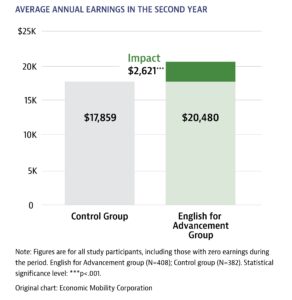Key Highlights
Challenges
Many new jobs within the Commonwealth are projected to require at least some postsecondary education. This requirement makes many jobs inaccessible for otherwise qualified workers who have not yet assimilated to the language and culture of the United States. Compared with immigrants who speak English fluently, those with limited English skills earn less and are less likely to hold a high school diploma. While created to aid non-English speakers, most English for Speakers of Other Languages programs are not well designed to meet the employment needs of the population they serve.
Meanwhile, an estimated 11%-20% of veterans each year return with post-traumatic stress disorder (PTSD) and often face significant challenges in transitioning back to civilian life and securing stable jobs. Many have valuable skills but struggle with symptoms like depression, anxiety, or lack of concentration. Persistent unemployment can exacerbate these symptoms, creating a negative feedback cycle.
Opportunities
Massachusetts has become a national leader in Pay for Success, developing outcomes-based public funding tools that tie funding to the success that programs realize in stable job placement for target populations.
The Massachusetts Pathways to Economic Advancement (MPEA) is a three-year program that combines vocational English classes with job search assistance. Funding from financial institutions, individuals, and foundations is only released into the MPEA when it achieves positive outcomes for participants. An independent evaluator measures the outcomes of the program’s participants. Through robust data collection and evaluation, the project is developing a better understanding of what works in the adult education and workforce development space.
Massachusetts also led the launch of the Veterans Coordinated Approach to Recovery and Employment (Veterans CARE), a Pay for Success project that brought together each level of the public sector — federal, state, and city governments — to scale the evidence-based Individual Placement and Support (IPS) intervention to get more veterans with service-based PTSD into stable jobs.

Findings and Next Steps
- A randomized controlled trial for MPEA showed that program participants earned higher wages than those in the control group, demonstrating initial success.
- Despite COVID-related disruptions, 55% of the veterans enrolled in Veterans CARE were employed as of December 2020, and the program continues to scale.
- Collaboration and partnerships were key: Both Pay for Success projects included regular meetings among partners and participating agencies to review progress and source data from other entities.
- This outcomes-based approach also worked well in other programs, such as job placement services for those with housing insecurity, criminal justice involvement, and behavioral health needs.




